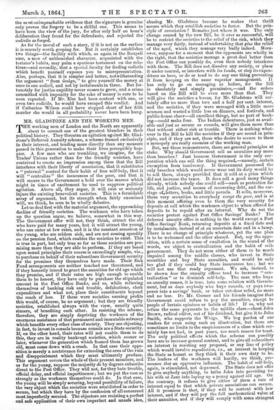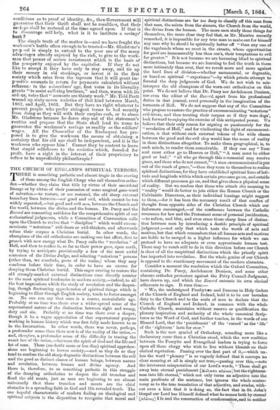MR. GLADSTONE AND THE WORKING MEN. T HE working men of
London and the North are apparently about to commit one of the greatest blunders in their political history. They threaten an agitation against Mr. Glad- stone's Deferred Annuity scheme, a scheme framed exclusively in their interest, and tending more directly than any measure passed in this generation to make their lives perceptibly hap- pier. A few men who are trembling, we imagine, for the Trades' Unions rather than for the friendly societies, have contrived to create an impression among them that the Bill interferes with their liberty of association, that it substitutes a " paternal" control for their habit of free self-help, that it will " centralize" the insurances of the poor, and that it will secure to the Government a hold over the masses which might in times of excitement be used to suppress political agitation. Above all, they argue, it will ruin or seriously injure the existing benevolent societies. This is a formidable array of argument, but its strength when fairly examined will, we think, be seen to be wholly delusive.
Let us deal first with the material argument, the approaching decline of friendly societies. The workmen who have taken up the question argue, we believe, somewhat in this way. The Government offer will not, they think, attract the old who have paid for many years, but it will attract the young, who can enter at low rates, and it is the constant accession of the young, who are seldom sick, and are not coming speedily on the pension fund, which enables the societies to exist. This is true in part, but only true so far as these societies are pro- mising more than they are able to perform. If they are based upon sound principles their course is exceedingly simple, viz., to purchase on behalf of their subscribers Government security for the promises they themselves have made. Their Sick Fund arrangements are neither touched nor threatened, and if they honestly intend to grant the annuities for old age which they promise, and if their rates are high enough to enable them to be honest, they have only to purchase the stipulated amount in the Post Office Banks, and so, while relieving themselves of banking risk and trouble, defalcations, clerk expenditure and what not, place their constituents beyond the reach of loss. If these were societies earning profits this would, of course, be no argument; but they are friendly societies, established always with the view, usually quite sincere, of benefiting each other. In resisting the scheme, therefore, they are simply depriving the workmen of the enormous assistance of that permanent and immutable solvency which benefits every other class of society. They are objecting, in fact, to invest in consols because consols are a State security. If, on the other hand, their rates will not enable them to do this, they are in reality bankrupt societies, which sooner or later, whenever the generation which framed them has grown old, must come down with a crash. In that case their oppo- sition is merely a contrivance for extending the area of the ruin and disappointment which they must ultimately produce. This argument covers the whole of their present members, and as for the young, suppose the majority do by degrees subscribe direct to the Post Office. They will not, for they hate trouble, official delay, and official impertinence ; but we put the case as strongly as the workmen themselves could do. In that case, the young will be simply securing, beyond possibility of failure, the very object which the societies were established in order to secure, but which they have by the confession of all concerned most imperfectly secured. The objectors are resisting a perfect and safe application of their own imperfect and unsafe idea, abusing Mr. Gladstone because he makes that thrift secure which they establish societies to foster. But the prin- ciple of association ? Remains just where it was. The only change caused by the new Bill, be it ever so successful, will be to restrict the societies to the relief of the sick, which they manage very fairly, instead of undertaking that plus the relief of the aged, which they manage very badly indeed. More- over, suppose for a moment that the opponents are wholly in the right, that the societies manage a great deal better than the Post Office can possibly do, even then nobody interferes with them. The Bill does not dissolve any society, or place it under control, or interfere with its funds, or stop its expen- diture on beer, or do or tend to do any one thing preventing it from keeping on the same superior management. It has only to go on managing as before, for the Bill is absolutely and simply permissive,—and the orders based on the Bill will be even more than that. They will give the societies a bonus, for Mr. Gladstone will cer- tainly offer no more than two and a half per cent. interest, and the societies, if they were managed with a little more acumen and wasted a little less on dinners, and festivals, and public-house cheer—all excellent things, but no part of bank- ing—could make four. The Indian debentures, just as avail- able and just as secure as consols, will give them more than that without either risk or trouble. There is nothing what- ever in the Bill to kill the societies if they are sound in prin- ciple, and if they are not, those who desire to secure to them a monopoly are really enemies of the working man. But, say these remonstrants, there are general principles at stake. Why should Government sell us annuities any more than breeches ? Just because Government is the only cor- poration which can sell the thing required,—namely, certain exemption from insolvency. If Government possessed the only breeches which would never wear out its duty would be to sell them, always provided that it sold at a price which did not increase the taxes. It does sell a good many things already, which nobody else could sell—such as protection for life, and justice, and means of recovering debt, and the car- riage of,letters, books, and little parcels. It sells, moreover, these very securities to everybody except the poor, and is at this moment offering even to theta the very security for deposits at call which the workmen object to when offered for deposits to be repaid after an interval. Why do not the societies protest against Post Office Savings' Banks ? The deferred annuity office is nothing in the world except a Poet Office Savings' Bank, returning deposits at a fixed date and by instalments, instead of at an uncertain date and in a lump. There is no change of principle whatever, yet the one plan is to be welcomed and the other abused. But, say the oppo- sition, with a certain sense of exultation in the sound of the words, we object to centralization and tho habit of self- government. They do not seem either of them to be much impaired among the middle classes, who invest in State securities and buy State annuities, and would be only too glad if they could buy State insurances too ; but WO will not use that ready argument. We ask, instead, to be shown how the annuity offices tend to increase " cen- tralization" or to diminish self-help. Tho man who buys an annuity comes, it is true, into some relation with Govern- ment, but so does anybody who buys consols, cr pays two- pence into a savings' bank, or takes out-door relief, no more and no less. Da Mr. Cromer and his friends imagine that Government could refuse to pay the annuities, except to people of Certain opinions or habits of life? If so, why not refuse the same payments to the middle class—cheat John Brown, radical editor, out of his dividend, but give it to John Smith, who supports the Whigs. We beg pardon of our readers for even using such an illustration, but there are sometimes no limits to the suspiciousness of a class which cer- tainly has not had, in past years, too much reason for trust. The only political effects which the scheme can possibly have are to increase general content, and to give all subscribers an interest in resisting any proposal, or any line of policy which would involve repudiation, i.e., an interest in keeping the State as honest as they think it their own duty to be. The leaders of the workmen will hardly, we think, pro- nounce that an oppressive influence. The habit of self-help, again, is stimulated, not depressed. The State does not offer to give anybody anything, to bribe John into providing for his wife or Jane into laying up a penny against old age. On the contrary, it refuses to give either of them a rate of interest equal to that which private associations can secure. All it promises is that, if they will be content with low interest, and if they will pay the full mathematical value of their annuities, and if they will comply with some stringent conditions as to proof of identity, &c., then Government will guarantee that their thrift shall not be resultless, that their savings shall be restored at the time agreed upon. If that is to discourage self-help, what is it to institute a savings' bank ?
The simple truth of the matter is—and we have fought the workmen's battle often enough to be trusted—Mr. Gladstone's prep )sal is simply to extend to the poor one of the many adva'itages already enjoyed by the rich, to give to the work- man that power of secure investment which is the basis of the prosperity enjoyed by the capitalist. If they do not like to accept it they have only to stay away, and tie up their money in old stockings, or invest it in the first society which cries from the taproom that it will grant im- possible amounts in return for payments calculated without reverence to the subscribers' age, first votes in its liberality grants "to assist suffering brethren," and then, warm with its ardour, votes that " accounts are thirsty work." Mr. Tidd Pratt 'wound up sixty-seven societies of that kind between March, 1862, and April, 1863. But they have no right whatever to prevent people who prefer stringent terms to bad security from doing as they will with their surplus cash, or to abuse Mr. Gladstone because he dares step out of the statesman's routine and propose that the State shall lend its name to guarantee the workman's savings as readily as the soldiers' wages. All the Chancellor of the Exchequer has pro- posed is to give the workman the means of obtaining a certainty that his old age shall be independent, and it is the workmen who oppose him ! Cannot they be content to leave that stupid selfishness to the societies which, founded for profit, have a right in the interest of their proprietary to refuse to be unprofitably philanthropic ?































 Previous page
Previous page